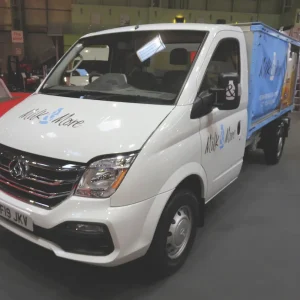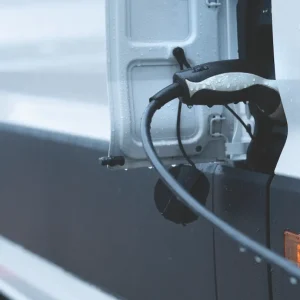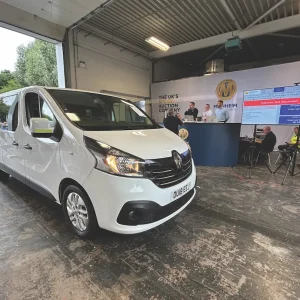 Money-hungry politicians and a cat's cradle of red tape are placing a growing burden on Britain's beleaguered van owners and drivers.
Money-hungry politicians and a cat's cradle of red tape are placing a growing burden on Britain's beleaguered van owners and drivers.
One of the biggest blows to date came smashing down on 6 April this year. Light commercial drivers employed by businesses discovered to their horror that the scale charge — what the tax man reckons unlimited private use of a van is worth — had just risen from £500 to a whopping £3,000.
That's a bitter blow, but at least driving from home to work and back again isn't counted as private use. Using your light commercial to nip to the leisure centre or your local branch of Tesco's at the weekend to do a big shop is.
Fuel Economy & Emissions
 Happily this tax hike won't affect you if you're self-employed. Something that will affect everybody, however, is the government's demand that fuel economy and CO2 emission figures for all new vans must be provided by the industry no later than 1 January 2008.
Happily this tax hike won't affect you if you're self-employed. Something that will affect everybody, however, is the government's demand that fuel economy and CO2 emission figures for all new vans must be provided by the industry no later than 1 January 2008.
It's a good idea on the face of it. Knowing how much fuel a light commercial will consume will aid buying decisions and the environmentally conscious may want to take CO2 output into account too.
Examine the whole idea more closely, however, and it quickly becomes apparent that the main motivation behind it isn't to assist operators.
Once the authorities know how much CO2 a van produces, they can tax it accordingly. So that's another bucket-load of money scooped out of the pockets of van owners and into the Treasury's coffers.
Ill-Conceived
What is more, there is considerable doubt about how much use the figures will be and whether they will reflect a vehicle's real-world performance.
People buy vans because they want to carry loads and a laden vehicle consumes more fuel than an empty one. However, the data will apparently only show what a vehicle can achieve when it has no cargo on board.
Nor will it take into account the fact that vans are used in very different ways. A courier who spends most of his time on high speed motorway dashes will have a different story to tell about fuel consumption than somebody who is on stop-start city centre delivery work.
Lack of Info
While it seems likely that the new rules will apply solely to vans introduced after January 2008 and will not require vehicles already on sale to be tested retrospectively, light commercial manufacturers complain that they have been told next to nothing about the proposed testing regime.
“So far as I'm aware no other European country is asking for such figures to be produced and these tests will involve considerable expense,” says Louise O'Sullivan, Renault light commercial brand manager.
Move up the weight scale and things are getting even more painful.
Speed Limiters
Goods vehicles — including large vans — grossing at from 3.5 to 7.5 tonnes and first registered between 1 October 2001 and 31 December 2004 now have to be retrofitted with speed limiters that restrict them to 56mph. The new law came into effect on 1 January.
From 1 January 2008 the law will also apply to all vehicles first registered after 1 January 2005 and only used in Britain. Vehicles used in Europe and registered after 1 January 2005 are already affected.
Digital Tacho
 All new vehicles grossing at above 3.5 tonnes are fitted with digital tachographs these days rather than the old style analogue tacho that traced details of the driver's activities on a waxed chart.
All new vehicles grossing at above 3.5 tonnes are fitted with digital tachographs these days rather than the old style analogue tacho that traced details of the driver's activities on a waxed chart.
They're being used throughout the EU and anybody driving a vehicle equipped with a digital tacho has to insert their personal smartcard into the onboard unit. Costing £38 apiece the cards are available from the Driver and Vehicle Licensing Agency and it is an offence to get behind the wheel of a digital vehicle if you don't possess one.
Over-Reading
Unfortunately there's one big problem with a digital tachograph. It has a tendency to over-record driving time, especially in situations where a driver is constantly stopping and starting; if he is on multi-drop delivery work for instance.
“It could show that he's been driving for at least 10 to 15 minutes more in a day than he actually has,” says Road Haulage Association policy director, Jack Semple. Some firms are suggesting that the daily record could be out by as much as 45 minutes.
The result could be a prosecution for breaking the Drivers Hours rules.
“The European Commission has recognised that it's a problem and we're asking the Vehicle and Operator Services Agency to take on board the scale and seriousness of the situation,” says Semple. What they can do about it is another matter.
It took months and months of tortuous negotiations involving all the EU countries before the digital tachograph's specification could be agreed on and it would take many months more to alter it. In the meantime, the courts have to accept whatever the digital unit shows as a true record of what's been going on; even if it isn't.
The Drivers' Hours rules were changed on 11 April. Click here for more information. .
Professional Competence
Drivers and employers will soon have to get to grips with yet another legislative change; the introduction of a compulsory driver's Certificate of Professional Competence from September 2009.
Not to be confused with the CPC held by managers in haulage companies, it means that drivers of most good vehicles grossing at above 3.5 tonnes will have to undergo additional compulsory training.
“The aim is to improve skill levels and thus road safety and reduce fuel consumption,” says Bob Jarvis, head of customer relations at the Driving Standards Agency.
Existing drivers won't have to obtain a CPC until September 2014, but will be obliged to undergo 35 hours of training during the previous five years — ie from September 2009 onwards — in order to get it. The training can cover anything from defensive driving to load security and no exams are involved.
Courses and training providers have to be given the thumbs-up by a new body called JAUPT, the Joint Approval Unit for Periodic Training. Each driver will have to carry a card to show that he's done his 35 hours and won't be allowed to drive if he hasn't got one.
Congestion Tax
Going back to tax, on 19 February London's congestion tax zone was extended westwards to cover Kensington and Chelsea despite strong protests from residents and businesses. Needless to say there is no concession anywhere in the zone for goods vehicles, despite the fact that they play a vital role when it comes to keeping the capital functioning.
It's all enough to make you want to start smoking again if you've given up. Don't even think about it.
No Smoke
In England from 1 July onwards smoking will be banned in all company vehicles, including light commercials, likely to be used as a workplace by more than one person, regardless of whether they are in the vehicle at the same time. Similar legislation is already in force in the rest of the UK.
Drivers who flout the rules could be fined anything from £50 to £200, while employers who fail to enforce them could face a penalty of up to £2,500.
Mobile Phones
Don't contemplate ringing up the authorities on your hand-held mobile phone while you're at the wheel to complain about all the foregoing. If you're caught doing that then you're looking at three points on your licence and a £60 fine thanks to changes that came into force on 27 February.
Now that's something What Van? definitely agrees with. Anybody who drives around jabbering into a hand-held deserves everything they get because they're endangering the lives of other road users as well as their own safety.
We're also more than happy to support the use of cameras to monitor box junctions and traffic lights, although it's a pity they're useless when it comes to catching cyclists who hurtle through on red.
Don't get us started on speed cameras, though…





